Congratulations to the Class of 2023!
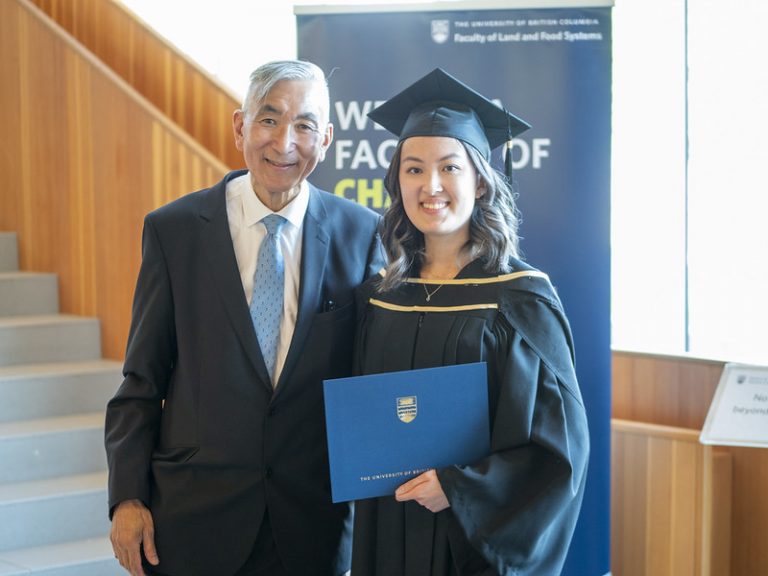
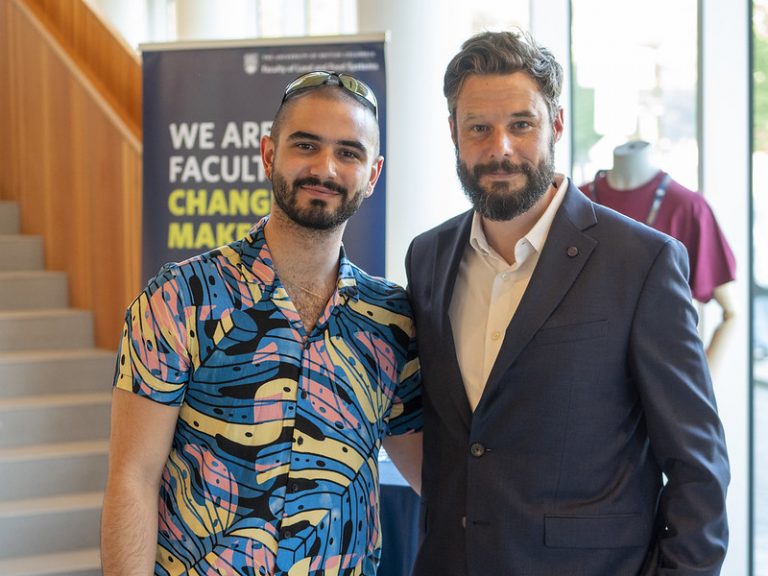
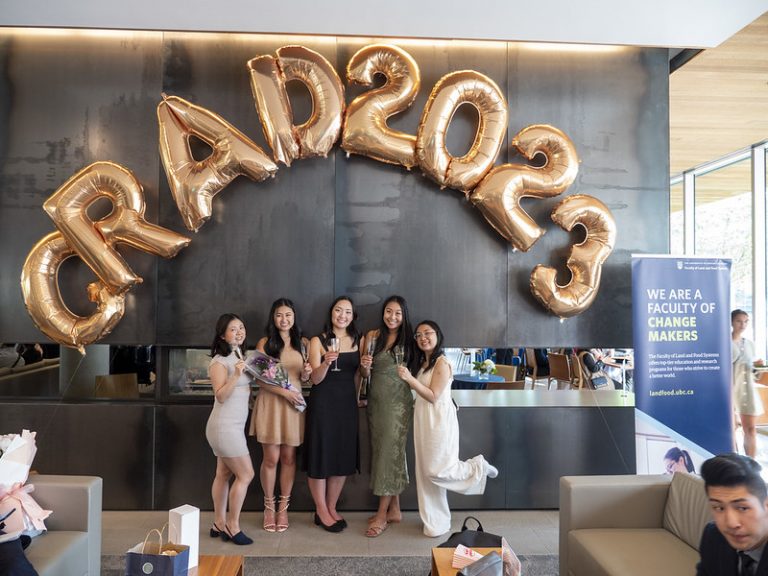
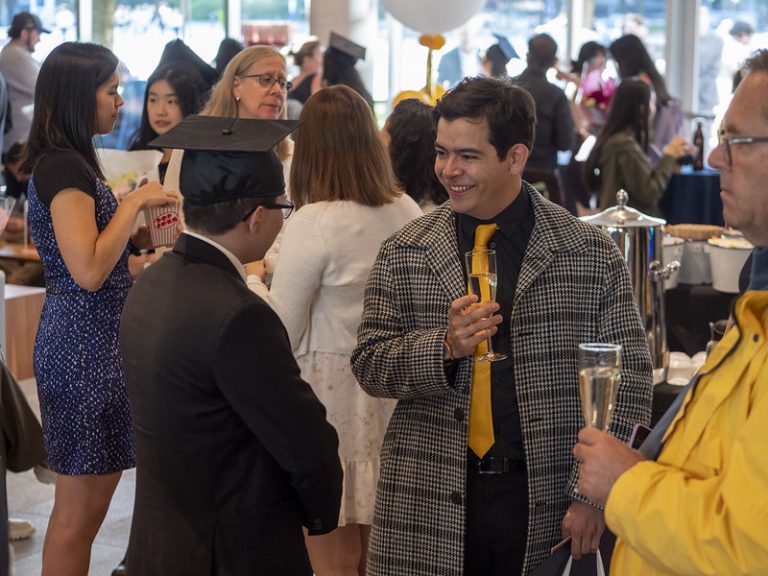
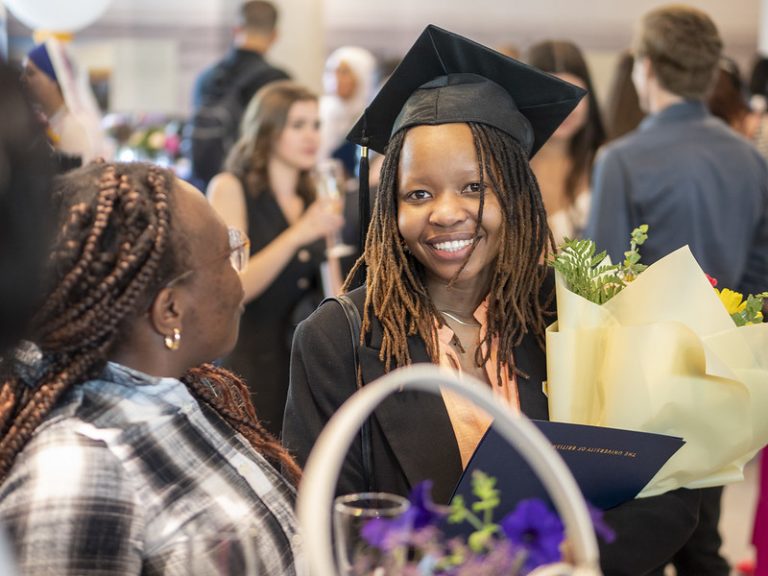
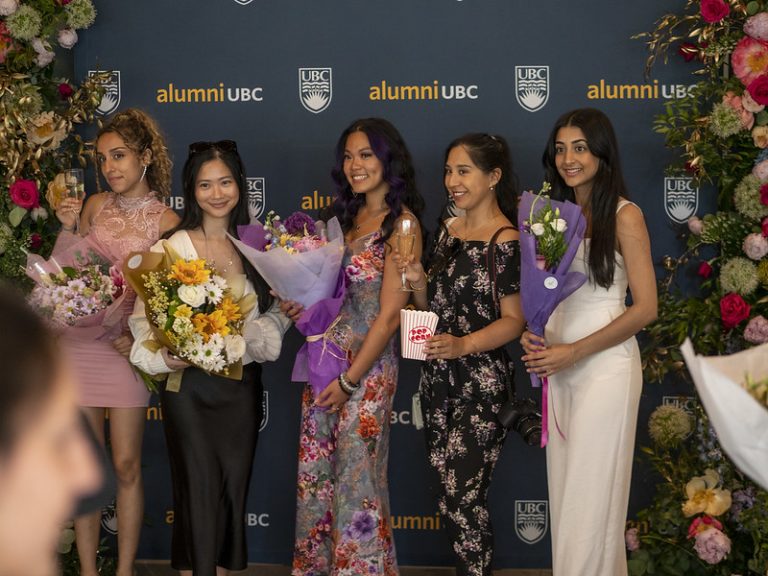
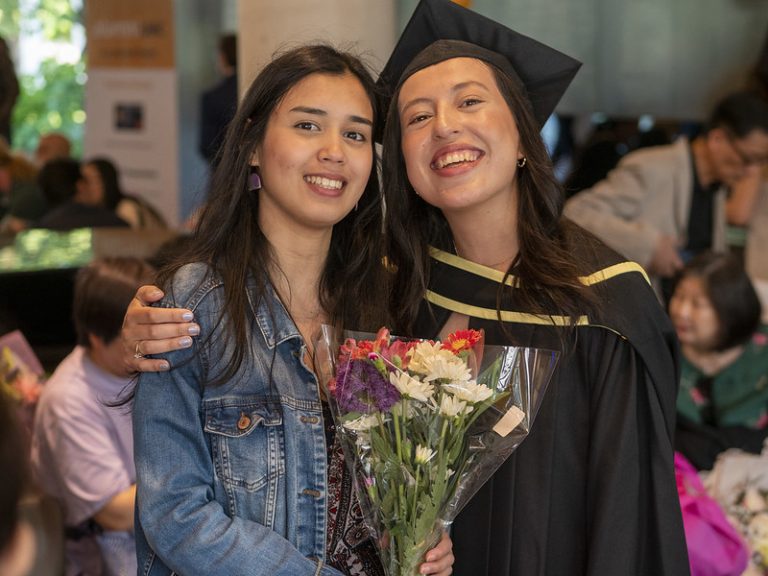
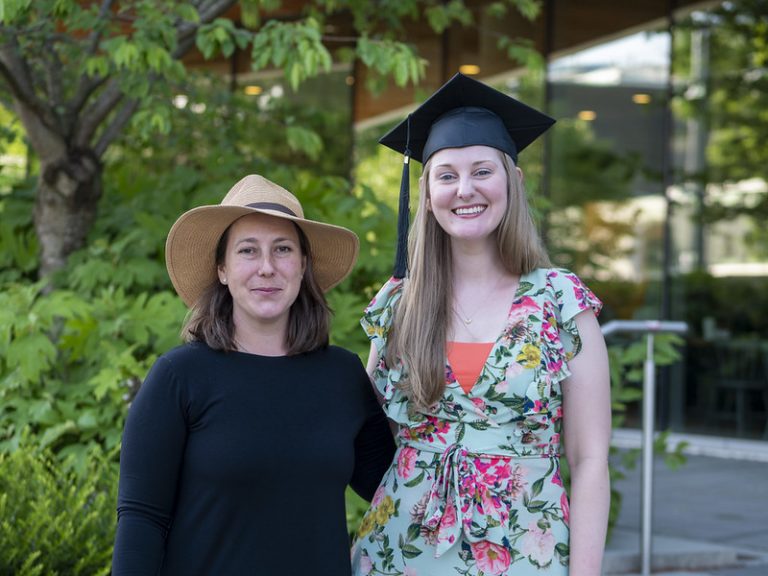
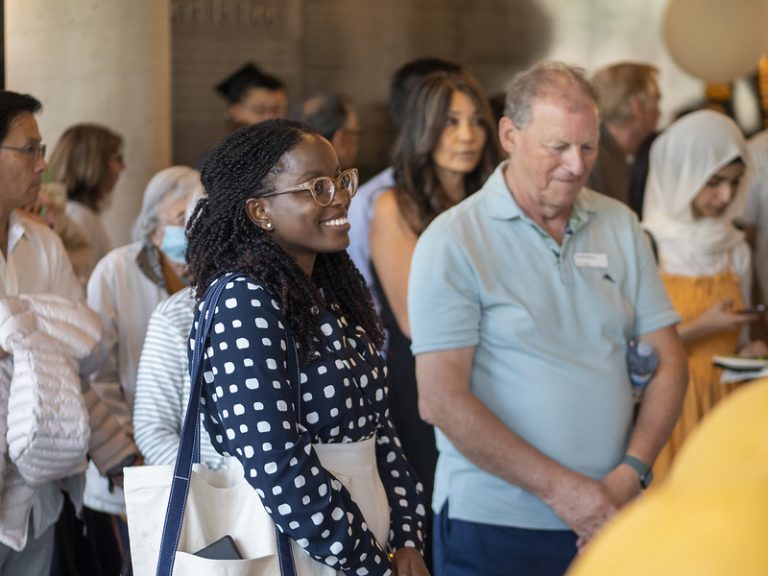
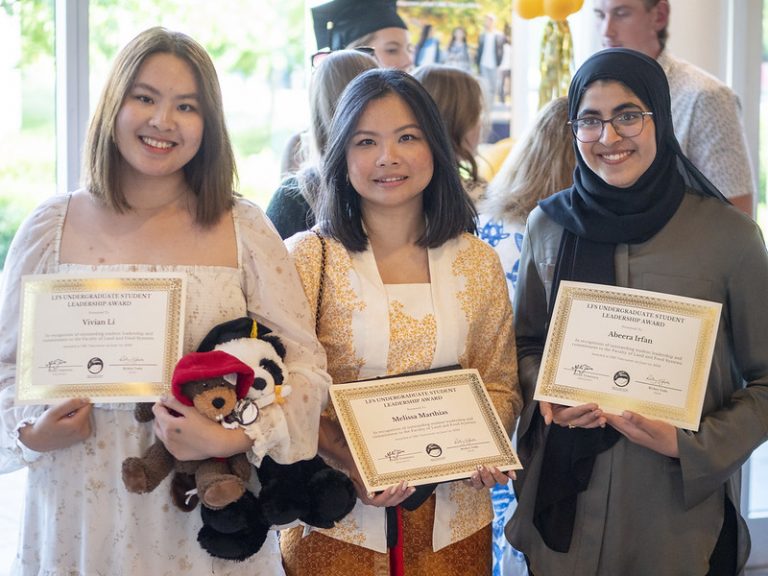
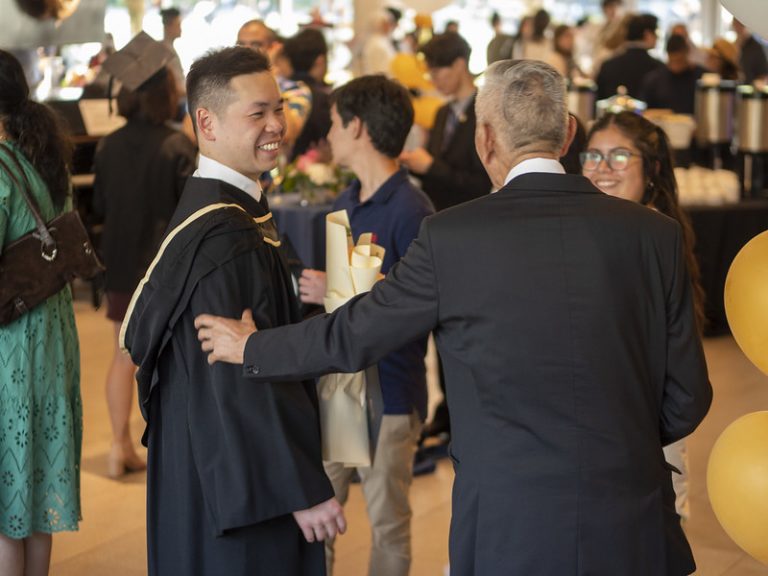
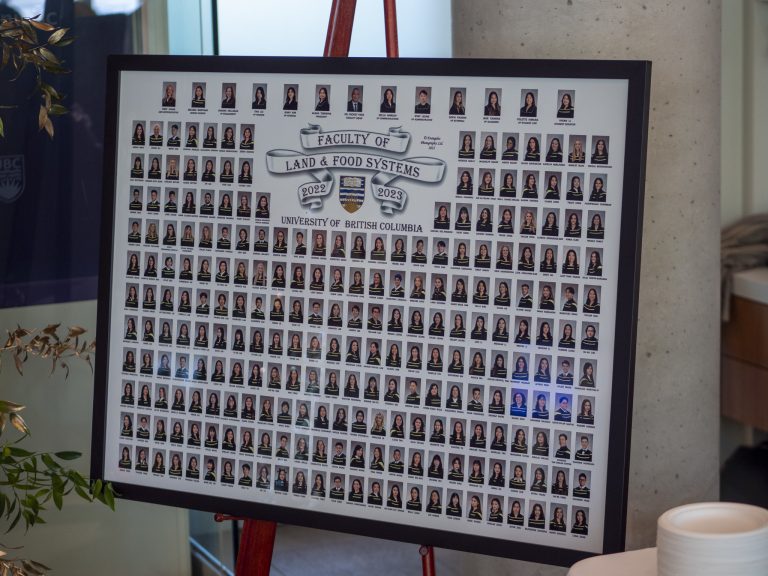
Tagged with: 2023, Graduate, Undergraduate
June 21, 2023
Tagged with 2023, Graduate, Undergraduate
Categories: News
June 21, 2023
A version of this article originally appeared on UBC Applied Science.
A new course to set a baseline understanding of Indigenous matters among UBC faculty and staff is officially launching on National Indigenous Peoples Day (June 21).
Weaving Relations is a self-paced, online training course that explores Indigenous histories, people and contexts, as well as settler colonialism in Canada, through the lens of Indigenous-Canadian relationships.
Developed jointly by the Faculty of Applied Science and the Faculty of Land and Food Systems (LFS), Weaving Relations will serve as a foundational course and the first of a three-part, forthcoming certificate in Indigenous cultural humility for UBC settler faculty and staff.
The other two components in the certificate will use Indigenous knowledge and customs to deepen individuals’ application of learned material. These will be in the form of an experiential learning and a reflective cohort for those who have completed the Weaving Relations course, as well as a land-based learning cohort at UBC Farm and the xʷc̓ic̓əsəm garden.
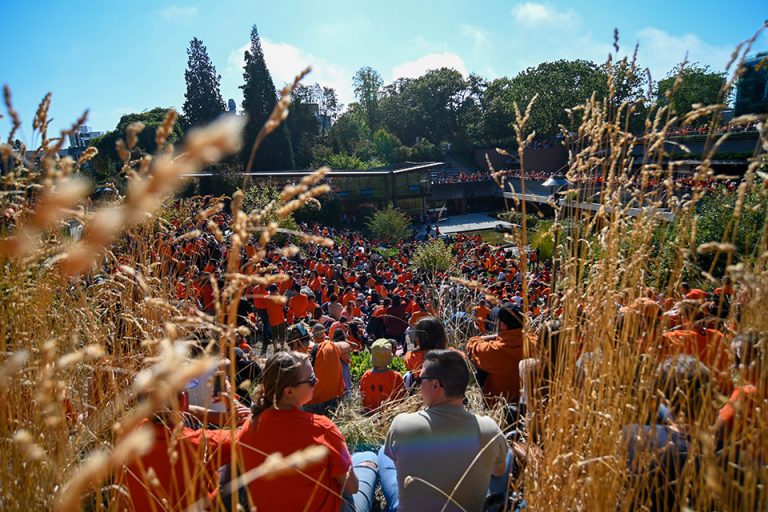
Large crowd gathered outside the Indian Residential School History and Dialogue Centre at UBC on Orange Shirt Day. Weaving Relations aims to lay a foundation for meaningful dialogue. (Photo credit: Paul Joseph and UBC Applied Science)
The full certification program, known as the Indigenous Design and Engagement in Applied Science and Land and Food Systems (IDEAL) certification, will launch in 2025. This certificate is made possible as part of a $250,000 award from the Indigenous Strategic Initiatives Fund under the transformation stream.
The certificate aims to meet the goals of the Indigenous Strategic Plan, particularly action 34 to “develop and deliver Indigenous history and issues training for all faculty and staff,” as well as Applied Science and LFS priorities to build inclusive leadership and respectful engagement.
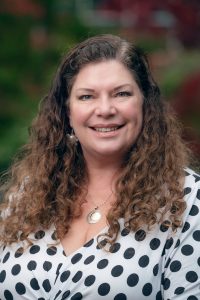
Dana-Lyn Mackenzie
Dana-Lyn Mackenzie, senior manager of equity, diversity, inclusion and Indigeneity (EDI.I), and a Coast Salish person from the Hwlitsum First Nation, co-developed the course with Erin Keely, Indigenous engagement coordinator with UBC Applied Science. Mackenzie explains her motivations for proposing the course:
“At first, I noticed a gap in offerings in education on Indigenous knowledge. People would come into training courses with a wide variety of background knowledge, which meant trainers were covering the same basics at every workshop. That made it difficult to delve deeper into topics within a limited time frame.
“We wanted to lay a foundation to help people engage more meaningfully in conversations, so we created the Weaving Relations course to bridge that gap, and then make it part of a bigger certification.”
While originally envisioned for faculty and staff, Weaving Relations is now available to anyone at UBC with a campus-wide login, and will equip individuals with the fundamental competencies needed to reflect and engage in deeper conversations as part of the important and meaningful work of reconciliation.
“Reconciliation is everyone’s responsibility. Our hope is that Weaving Relations provides the necessary foundational training for people, and particularly settlers to this land, to help them on their journey of understanding and action to advance reconciliation,” said Dr. Sheryl Staub-French, associate dean of EDI.
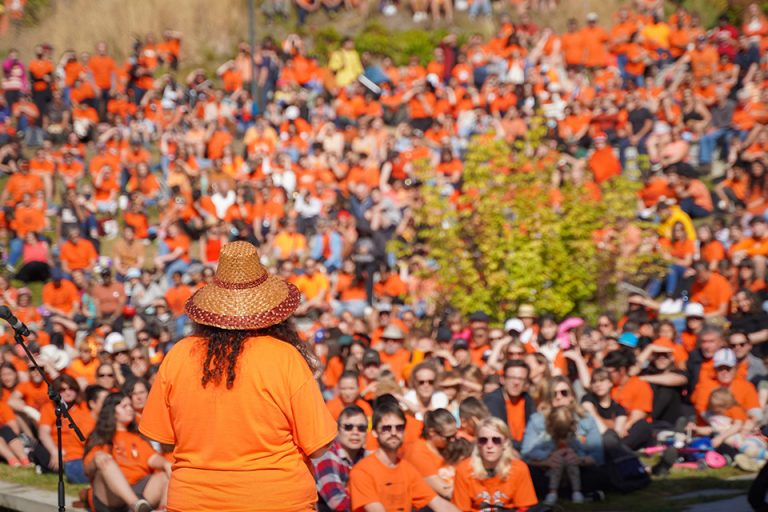
Dana-Lyn Mackenzie speaking to hundreds of attendees at UBC for the Orange Shirt Day intergenerational march. (Photo credit: Oliver Mann and UBC Applied Science)
“Having a baseline understanding of Indigenous histories and perspectives, cultural humility and anti-racism tools is critical for all the work that we do, and absolutely necessary to create inclusive spaces and places at UBC where everyone can thrive.”
Weaving Relations is intended to transform not only individuals’ understanding of Indigenous history and issues, but also UBC systems that will enable more empathetic, thoughtful policies.
“If we can transform administrative policies that – unintended or not – currently create barriers, and can instead decolonize processes in areas that traditionally haven’t engaged with Indigenization as much, we can really begin to build better relationships with our students, faculty and staff,” said Mackenzie, who earned a UBC President’s staff award in 2016 for her impact in developing Indigenous awareness programming for the Peter A. Allard School of Law.
“Indigenous knowledge and expertise should not only be an EDI matter – they should be in all spaces. Reconciliation is the job of every person living in Canada to engage in. Educating and applying different perspectives on Indigenous knowledge is what will make long-lasting, meaningful change.”
Tagged with: 2023, Equity Diversity Inclusion and Indigeneity, Indigenous, Staff
Tagged with 2023, Equity Diversity Inclusion and Indigeneity, Indigenous, Staff
Categories: News
June 19, 2023

| Name | Pailin Chongchitnant |
| Title | Chef, Author, YouTuber |
| Grad year | 2007 |
| Program | Bachelor of Science in Food, Nutrition and Health |
June 19, 2023 – I met lifelong friends who are still my friends to this day. I also loved the opportunities to learn and experience many new things through various events and extracurricular activities.
I just finished up with my second cookbook SABAI, which is out now. And I’m continuing my regular work of producing Thai cooking videos on the YouTube channel and my website.
My time at LFS most importantly made me aware of the complex social, environmental, and economic issues around food. When I went to culinary school, we only talked about food in the context of cooking. So, many chefs go out into the industry knowing how to cook very well, but they were not given an opportunity to learn about all the other important issues that are closely tied to food.
Don’t hesitate to join any extracurricular activities that interest you. I’d say this was more important to me than the academics. There are so many clubs, events, volunteer opportunities, and any of them, or anyone you meet at any of them, could turn out to be an encounter with a new passion or even career path. These are the things that will enrich your life.
My favourite place to eat at UBC is hands down Only U Cafe in the village, which is also where I worked for 3 years while I was a student. Back then they only served classic diner breakfast and lunch, but the owners are Chinese Indians and they have now added amazing Indian food to the menu. It’s the best Indian food I’ve had anywhere, and it’s in the most unlikely of places. It’s also a great place to study with a coffee and a snack as it’s pretty peaceful during non-busy times.
Tagged with: 2023, Alumni, Food Nutrition and Health
Tagged with 2023, Alumni, Food Nutrition and Health
Categories: News, Profile Alumni
June 16, 2023
Global Resource Systems – 3rd Year
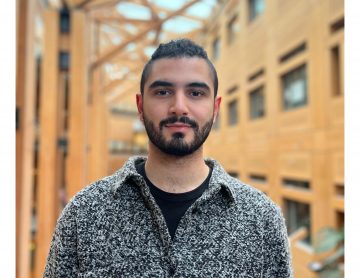
Joseph Al Rahmani
My first memory of UBC is when my sister received her acceptance letter when I was just 5 years old; I remember seeing the email on her computer screen as her scream of excitement echoed in the halls of our home. After her admission, my family and I would travel from Jordan to UBC every summer. I experienced many firsts here at UBC: University Village is where I got my first scar from learning how to ride a bike, the old Aquatic Centre is where I jumped off my first diving board, and my first bus ride was on the notorious 99 B-line. UBC has been weaved into the fabric of my existence, and now so is the faculty of Land and Food Systems. I chose the faculty of LFS because I had a deep interest in sciences that many consider “non-conventional;” I, later on, discovered that the courses that I had learned at LFS are probably the most applicable and useful courses one could take at UBC. No matter your program in this faculty, you come out as a well-rounded individual.
The best part of my university experience was moving into the Global Resource Systems (GRS) program. The interdisciplinary nature of GRS has allowed me to explore my interests and build my own program around a specific resource and a region – International Development and Planning and Middle East Studies, respectively. As soon as I got admitted into the program, everything finally fell into place; my UBC experience started to look more and more like how I had envisioned it since I was a little boy.
I was involved in organizing and executing the first-ever UBC Carnival as a social coordinator for the LFSUS. It was such an amazing experience to see months of planning come to life, and the best part was seeing the number of people that enjoyed it!
Outside of my academics, I represent the Faculty of Land and Food Systems in the UBC Senate as a Senator. The UBC Senate is the highest academic governing body at UBC and it would surprise you how many of the decisions made affect students and faculty. As a senator I not only serve as a voting member on the UBC Senate, but I also serve on the Library subcommittee, the Appeals on Academic Standing subcommittee, the LFS curriculum committee, and as an honorary member of the LFS|US.
My favourite place to grab a bite is always dependent on what type of food I am craving, but my on-the go-to is always Tim Hortons. Gotta love a classic double-double!
The Law Library at Allard Hall will always be my favourite place to study. There is something about sitting in a room with future lawyers that always keeps me motivated to get my work done. And of course, Agora space and the Pod are always great places to sit and relax.
Tagged with: 2023, Global Resource Systems, Undergraduate
Tagged with 2023, Global Resource Systems, Undergraduate
Categories: News
June 6, 2023
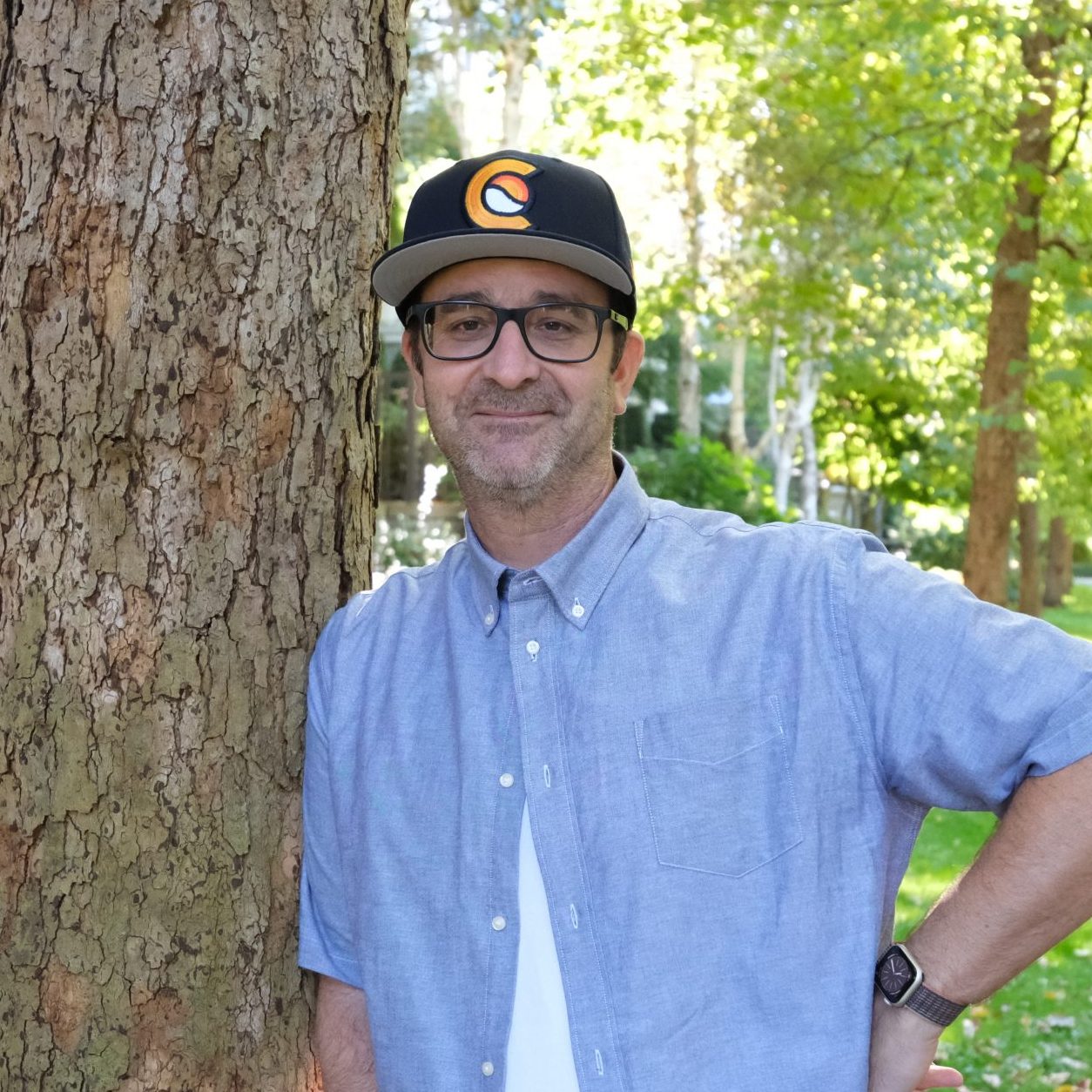
604-822-3688
MCML 241
University of British Columbia, MA, English Literature, 2005
University of British Columbia, BA, English Literature, 2003
Langara College, Diploma, Arts & Sciences, 2001
FRST 150 (soon to be NRES 150): Scholarly Writing and Argumentation in Forestry
LFS 150: Scholarly Writing and Argumentation in LFS
Mentor for the LFS Mentorship Program (2022-Present)
Forestry Jumpstart Faculty Fellow (2023)
Large TLEF co-applicant (PI Lindsay Cuff, co-applicant Candice Rideout): “Flexible hybrid writing instruction throughout undergraduate curricula: Fostering students' growth, persistence, and identity as writers in scholarly communities and beyond”
One of the key elements of UBC’s current strategic plan is “place and promise.” Thomas King claims that “the truth about stories is that that’s all we are.” Northrop Frye thinks that Canadian identity “is less perplexed by the question ‘Who am I?’ than by some such riddle as ‘Where is here?’”, suggesting that if you know where you belong, you know who you are. I begin my statement of teaching philosophy with these two thoughts because they laterally suggest, when mapped onto the art of teaching, that stories and environment (the classroom) are equally important to effective teaching. I’ve been thinking back on a 18 year teaching career, the story of it – 140 courses, 89 composition classes – and how I got to be the teacher I am today. There are so many things a teacher needs to account for; so many things matter; and teaching and learning is the best when all these things – course design, teaching strategies, teaching persona, students laughing, students telling the stories of their learning, students mastering university level writing skills, students belonging in their learning – are created in a classroom that’s inclusive, fun, collaborative, learner-centric (Antón 1999), and ultimately a kind and generous community of learning.
Lang’s (2016) Small Teaching, and especially his “big teaching” SoTL suggestions about motivating and “growth mindset” teaching, inform the teaching I do today. First, I respect and like my students. Lang is right: when sharing enthusiasm for the subject, when showing compassion, and when rewarding student growth, learning happens best. Second, I support students through the significant challenges that constitute a higher education degree and first year university life, and specifically in demanding writing classes, writing classes where students need to feel that their own commitment to the material and to their learning is matched by my own. I realize that mastering the writing skills in a composition class is always already challenging, and therefore the craft of teaching should be supporting those challenges with humor, championing students’ growth, and making the learning as fun as possible along the way. Enjoying school and the process of learning, however hard, helps us through those challenges. I see my role as an educator to be creating an enjoyable learning environment, one where the challenges are shared; this is the craft of student-centric teaching.
Teaching is about students, about meeting their learning needs, about giving them reasons to be in class, about supporting and nurturing their learning. So, my teaching philosophy is to walk in their shoes—to respect their place—which is to say care about their experiences as students and to listen with compassion to their stories. In part, I’m calling here on Frisby and Martin’s (2010) “rapport” in teaching. Ultimately, I’m thinking here about a classroom environment as a place where students belong, and if students feel like they belong, they’re more likely to learn. Students can belong in fragile ways, especially during midterms at UBC and when work piles up and gets really, really hard, and even more especially in writing classes (Solomon, Lawson, Croft 2011). I remind students that they belong at UBC, that they’re not dumber now than when they got here (no matter how bad their midterms make them feel), that they earned their place at UBC.
So, maybe it’s not radical to think that kindness is fundamental to teaching well, as part of the story and “place and promise” of teaching well. As discovered by Porta and Flores (2017), kindness creates a memorable culture of belonging, and a culture of belonging in a learning environment makes you invest in the skills you’re mastering. My kindness approach manifests during the semester in the following ways: lots of availability (student hours, previously known as “office hours”); total support and guidance and check-ins with TAs; lots of empathy for student and TA lives. I think kindness walks hand-in-hand with generosity. Kindness and generosity in the classroom happens when you call students by their names, when you check in with students who have disappeared (“I’ve noticed you’ve been absent for a few classes. Just checking in to see if you’re okay?), when you have Powerbars on hand when students are hungry, when you provide extensions on assignments for students who are overwhelmed (or even for the entire class). Kindness is also when you listen to their stories about school, when you take them for a walk outside during the stressful times of the term and ask that they put their faces to the sun (reminding them to practice self-care). I also remind my students to prioritize sleep because sleep in the mind’s fuel, and let them know that their voices matter (because they do!).
Kindness and support for my International students in Forestry and LFS are so important in teaching LFS and FRST 150. I provide extra support and encouragement to International students (and teaching a system of learning writing that doesn’t leave them confused and frustrated). Because many of my composition students are International students, and because my classes are multicultural, scholarship on cultural factors affecting academic learning (Brown and Huang 2009) and scholarship on ethnic identities and their impacts on efficacy and self-esteem and achievement (Jaret and Reitzes’ 2009) is necessary to make these students feel comfortable in their learning. Students matter; their past experiences matter; their learning experiences matter. I endeavor to have my LFS and FRST 150 composition classes be the most supportive, memorable class they take in first year, and to make my classes contributors to a culture of equity and inclusion at UBC.
Covid-19 has made us all—students, teachers—miss walking into the classroom as the place of community-based, collaborative learning. Political geographer John Agnew (Cresswell 2004) outlines the three fundamental aspects of place as a ‘meaningful location’, aspects which are location, locale, and sense of place. Location: a classroom in MacMillan or the FSC. Locale (“the material setting for social relations”): a classroom with chairs, desks, overhead projectors, white boards, and white board markers. Sense of place: a teacher’s job (my job) is to create that comfortable sense of place for students, to create students’ “emotional attachment” to the classroom. And even when international, Canadian, and Indigenous students all find UBC as home to mean different things, I want to make my classroom home for all students. That’s ultimately my teaching philosophy: learning as home. I obviously want my students to learn how to write for a University audience by the time they complete LFS 150 or FRST 150, to leave with the story and craft of Scholarly Writing and Argumentation in their disciplines, but I also want them to walk into my classroom (their classroom) as if it where home. The story of the “where is here?” and “place and promise” of my composition classrooms is kindness and belonging.
Tagged with: Faculty, Food Nutrition and Health
Tagged with Faculty, Food Nutrition and Health
Categories: Profile Faculty, Profiles
June 5, 2023
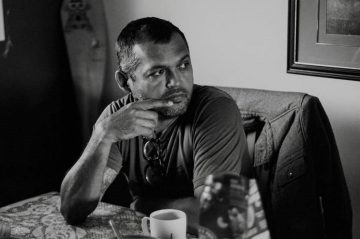
Wilson Pereira Mendes
Wilson Pereira Mendes, a true blessing to this world, left us on May 30, 2023. Throughout his journey, Wilson possessed a remarkable ability to make others feel seen, supported, and loved. He radiated joy and positivity, brightening the lives of those he encountered.
Born on June 2, 1974, in Aquidauana, Brazil, Wilson carried a deep love for his homeland and was committed to learning and proudly sharing his Indigenous Terena and Guarani-Kaiowá/Mozambican cultural teachings. As a Sun Dancer and community leader, Wilson was committed to social and environmental justice and improving the lives of Indigenous people. He spent his life advocating for equity and sustainability, never wavering in his devotion to improving humanity.
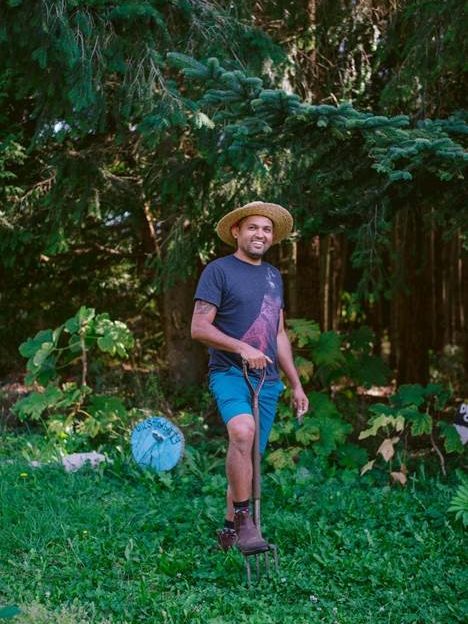
Wilson pursued a Master’s in Indigenous Planning and a PhD in Integrated Studies in Land and Food Systems. His doctorate took place on the unceded traditional and ancestral Territories of the xʷməθkʷəy̓əm (Musqueam) People, at xwc̓ic̓əsəm Garden at UBC Farm. Wilson’s research focused on the intersection of Indigenous regenerative land-based education and Indigenous food sovereignty to support Indigenous urban youth’s health, identity, and wellness. As an Indigenous scholar, Wilson contributed to creating and holding safe and sacred spaces to support the voices and visions of Indigenous peoples worldwide in response to colonialism, climate change, and capitalism. He left an incredible legacy of inspiration, hope, and motivation for those battling discrimination, inequality, and social injustice.
Wilson’s love and dedication to his family was inspiring. Wilson was a cherished son to his mother, Terezinha Pereira Mendes, and dear grandson to the late Maria Toledo Mendes and Alcides Pereira Mendes who helped raise him. His early formative years were shared with his cousins Robson, Evelin, Aparecida, Cristiane, Alcindio, and Reinaldo, forging deep bonds that lasted a lifetime. He was a devoted husband and partner to Fiona Smulders for twelve rich years, and a caring and supportive Father to his three beautiful children João Victor Mendes, Attila Kovacs-Mendes, and Jade Mendes. He has now joined his Father Wilson Pereira Alves and grandparents and will remain in the hearts of his family forever.
May Wilson’s spirit continue to dance under the sun, guiding and inspiring all who were touched by his love and light.
His family and the entire community are grieving his loss. If you are interested and able to lend support, a Go Fund Me has been set up (here), along with a meal train for Fiona (here). All are invited to share memories and photos on a Facebook tribute page (here).
Please share widely with the individuals and communities he inspired and continues to inspire.
Remember to take excellent care of yourself and others as we support Wilson in his next spiritual quest.
Tagged with: 2023, Applied Biology, Equity Diversity Inclusion and Indigeneity, Faculty, Indigenous, Staff, UBC Farm
Tagged with 2023, Applied Biology, Equity Diversity Inclusion and Indigeneity, Faculty, Indigenous, Staff, UBC Farm
Categories: News
June 2, 2023
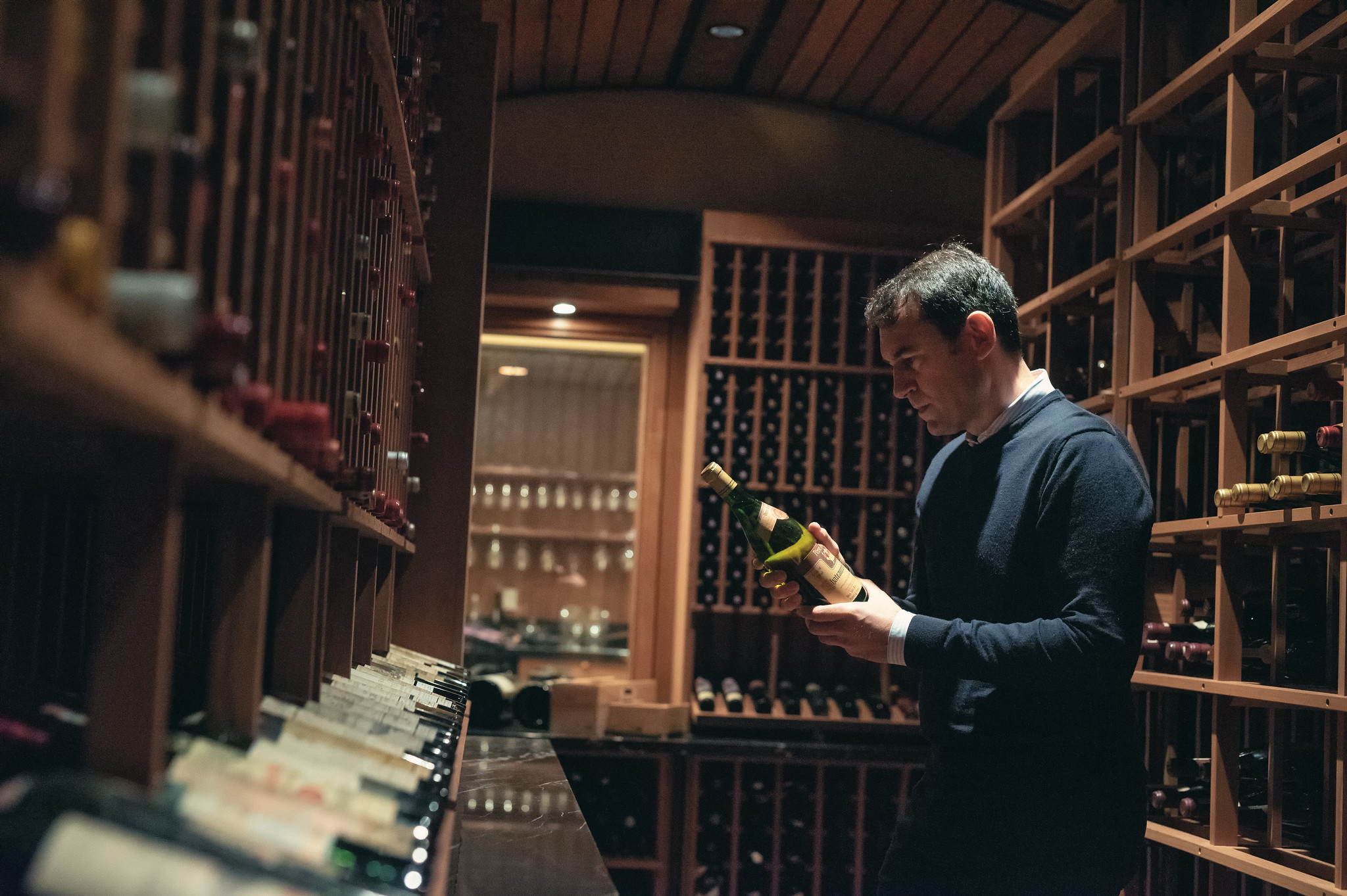
UBC Okanagan partners with University of Bordeaux – ISVV (Institute of Vine and Wine Sciences) to create a new course: Wine Tasting Ability (WTA) BC Canada Level One
This course develops foundational knowledge and skills in wine and wine tasting. It is the first level of a newly proposed 3-level WTA BC Canada program being developed through a unique UBC and University of Bordeaux collaboration.
The course allows those who are not acquainted with the world of wine to experience it in all its dimensions, as a multi-sensory environment that reflects the interaction between people and place. The credential is a taster of that complexity.
You will receive top-rate instruction from two industry experts: Dr. Axel Marchal, Professor, University of Bordeaux, ISVV
and Dr. Jacques-Olivier Pesme, Director, Wine Research Centre, and founding member of ISVV.
Specific course topics include:
The wine poured for the sessions comes from France and BC.
What: Three-level Certification; Wine Tasting Ability Level 1
When: 18th or 20th July, 2023; Both days will have the same curriculum, please choose whichever accommodates your schedule
Cost: $499 tax included – Early bird discount valid until June 30th. Industry group discount: purchase 4 and the 5th ticket is complimentary.
Format: 1 day, 8 hours (including educational lunch and a thirty-minute multiple-choice test)
Schedule:
Certification is provided by both institutions – University of Bordeaux-ISVV and UBC-Wine Research Centre. ISVV is a world leader in wine research and education
For more information, contact: wine.centre@ubc.ca
Tagged with: 2023, Applied Biology, Event, Wine Research Centre
Tagged with 2023, Applied Biology, Event, Wine Research Centre
Categories: News
June 1, 2023
Three students are being recognized for their leadership in the Land and Food Systems community. Abeera Irfan, Melissa Marthias, and Vivian Li and are recipients of the 2023 LFS Undergraduate Student Leadership Award, each making invaluable contributions of their time, energy and ideas to enhance student experiences in the Faculty.
In 2016, LFS Undergraduate Society (LFS|US) created the LFS Undergraduate Student Leadership Award to recognize students who have made contributions to student and Faculty life through their leadership, and left a lasting impact that will enrich the experience of LFS students.
Year level: Year 4
Program: Food, Nutrition and Health
Major: Dietetics
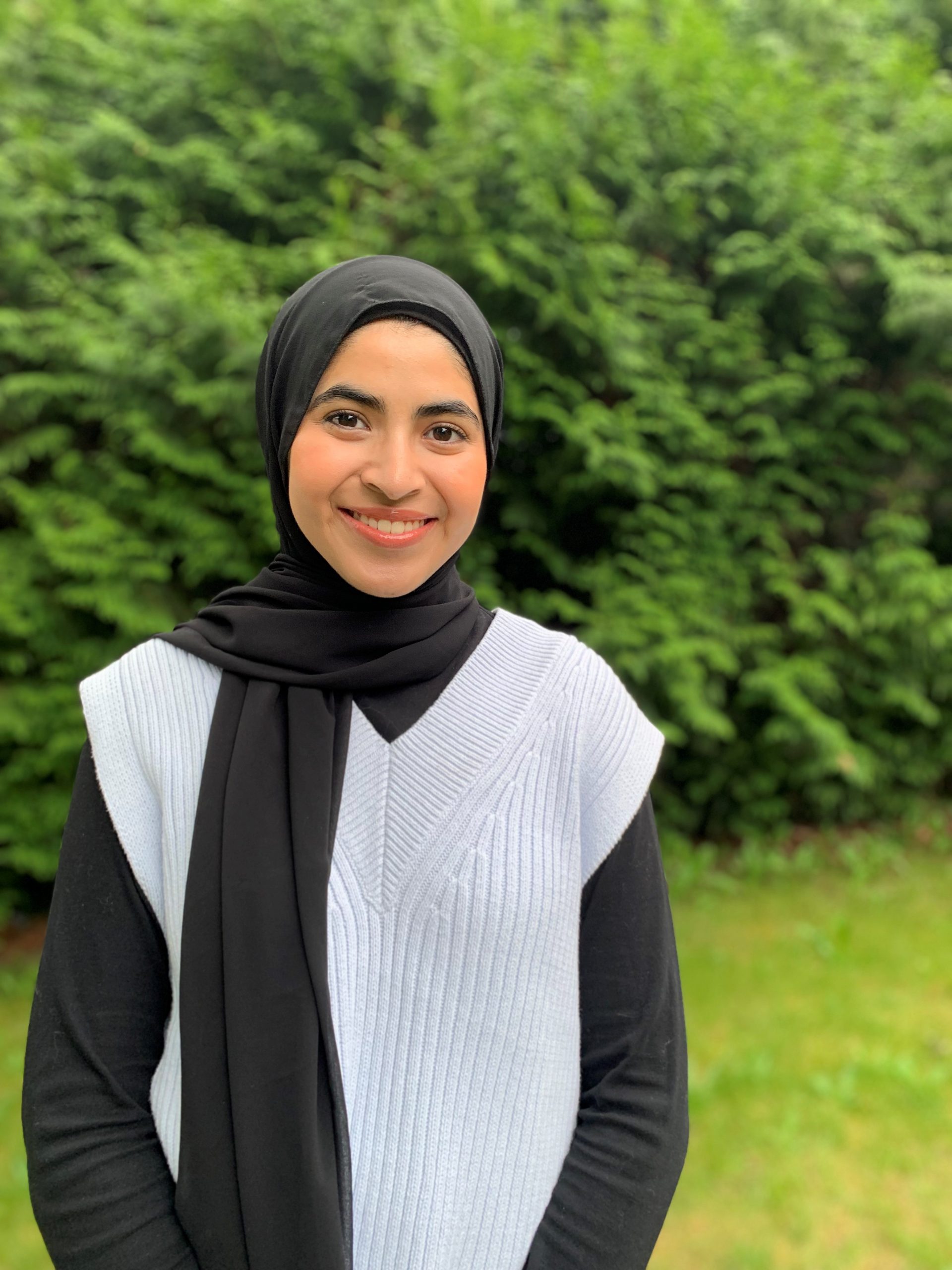
Abeera Irfan is a fourth-year Dietetics student whose time in LFS has had a profound impact on her academic, professional, and personal growth. This year, as President of the Dietetics Student Community, Irfan was honored to be mentoring a team of 12, third-year students in organizing events such as the club’s highly attended Meet the Dietetics Student Night. It was a full circle moment as she had attended that event in her first year. She was also a speaker at TEDxUBC 2023, which was an incredible opportunity outside of her comfort zone. Her experiences and learning in LFS have allowed her to think about how food has shaped her identity and its ability to provide intergenerational knowledge. Her talk conveyed the importance of storytelling through food, encouraging people to think about the role food plays in their lives. Another significant achievement for Irfan this year was collaborating with her peers and contributing her leadership into successfully bringing ‘Embrace’, the first 100% plant-based LFS Community Dinner to fruition.
Overall, Irfan reflects that the Faculty of Land and Food Systems has not only helped her achieve her academic and professional goals but also shaped her worldview. LFS is where Irfan’s love for biology, chemistry and anatomy bridges with her passion for social justice and advocacy work. She enjoys bringing LFS-related subjects into her engagements beyond the Faculty, such as her involvements with UBC Residence Life and UBC Global Lounge. We look forward to the impact Irfan will continue to make during her time in LFS. Irfan aspires to complete her undergraduate studies next year, and pursue further education in graduate school.
Tip for LFS students:
“Academics are important, but aren’t the only part of a university experience! Try getting involved in different areas that interest you and make sure you are taking time out to focus on your mental and physical wellbeing. Last but not least, say ‘Yes’ to the plans – school can get really busy but seeing friends and making memories with them is something I’ve really cherished.”
Year level: Class of 2023
Program: BSc in Food, Nutrition and Health
Major/minor: Food Science major, Fermentations minor
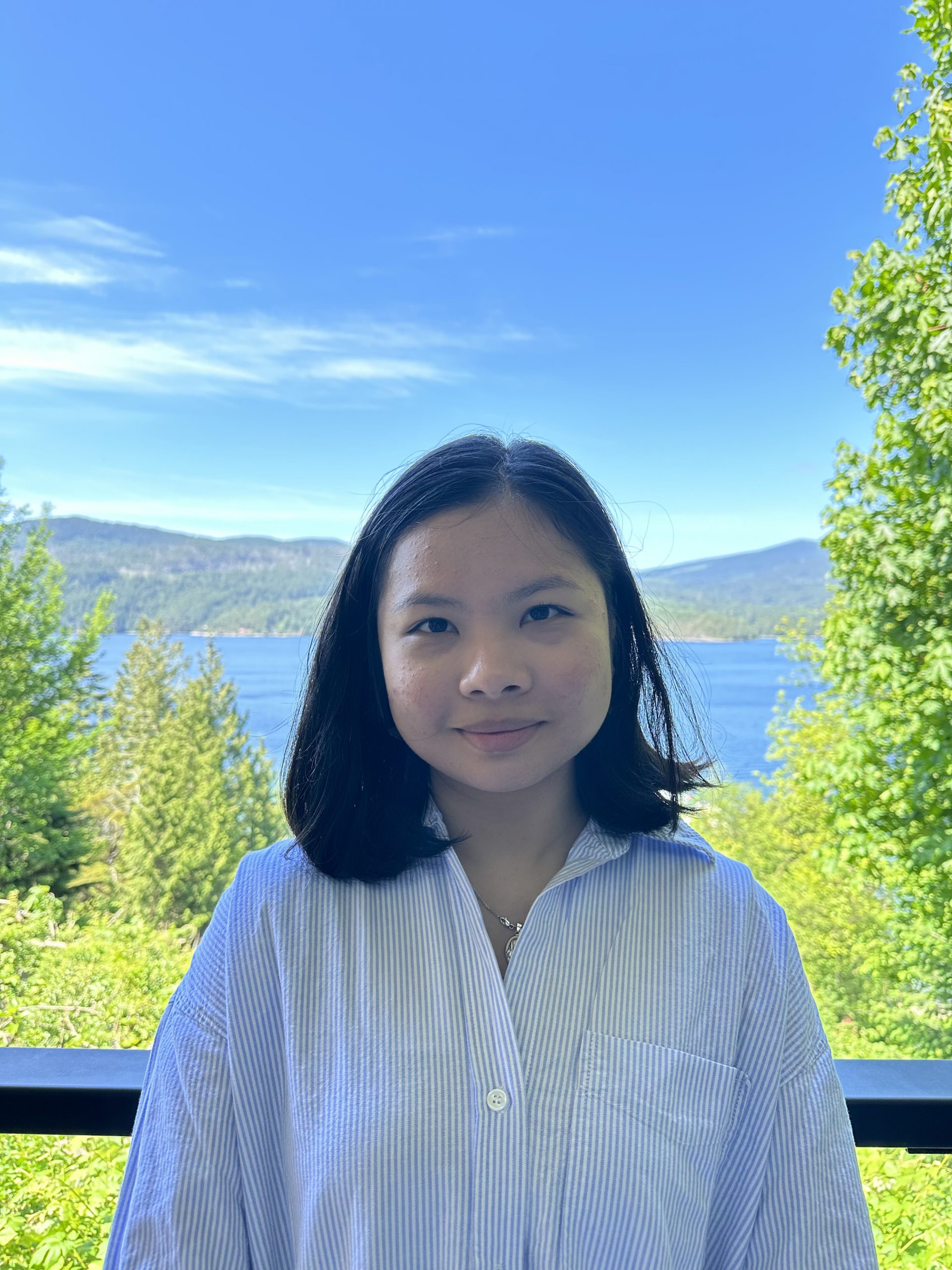
LFS is Melissa Marthias’s home away from home. It was where she developed her leadership skills. Where she made connections that pushed her to grow professionally and personally. A small, tight-knit, welcoming community, standing out from other UBC faculties.
Her inspiration to get involved came from participating in LFS|US’s Feeding 9 Billion case competition in her first year. This prompted her to begin her LFS|US journey as case competition coordinator. As she found her passion in giving back to the community, she wanted to continue create memorable experiences for the LFS community.
Marthias’s involvements during her university life included roles within LFS|US, LFS Orientations, LFS Firsts, UBC Food Science Club, UBC Student Leadership Conference, and more. She helped create connections within the communities that have supported her early on during her degree.
One of Marthias’s proudest achievements within the Faculty was the launch of LFS’s first student benefits program. As LFS|US VP External, she advocated for the launch of the program with aims of promoting local businesses and improving financial accessibility. Two years of hard work led to the launch of “Reggie Rewards” in 2022 with 17 business partners. She believes the program will continue to grow, providing more benefits to current and future LFS students.
After graduating in May 2023, Marthias is currently pursuing a Master of Management at UBC, hoping to merge her passion in the food industry with her entrepreneurial spirit. She still hopes to be connected to the Faculty, providing guidance to curious students like herself.
Tip for LFS students:
“Be open-minded and try out new things! Never ever limit yourself to what you already know. Step out of your comfort zone because you’ll never know what you’re truly passionate about until you experience new things. Don’t hesitate to talk to people – ask questions, learn about their involvements, start early. The Faculty is very welcoming and most people are open to helping others and accepting volunteers!”
Year level: Class of 2023
Program: BSc in Food, Nutrition and Health
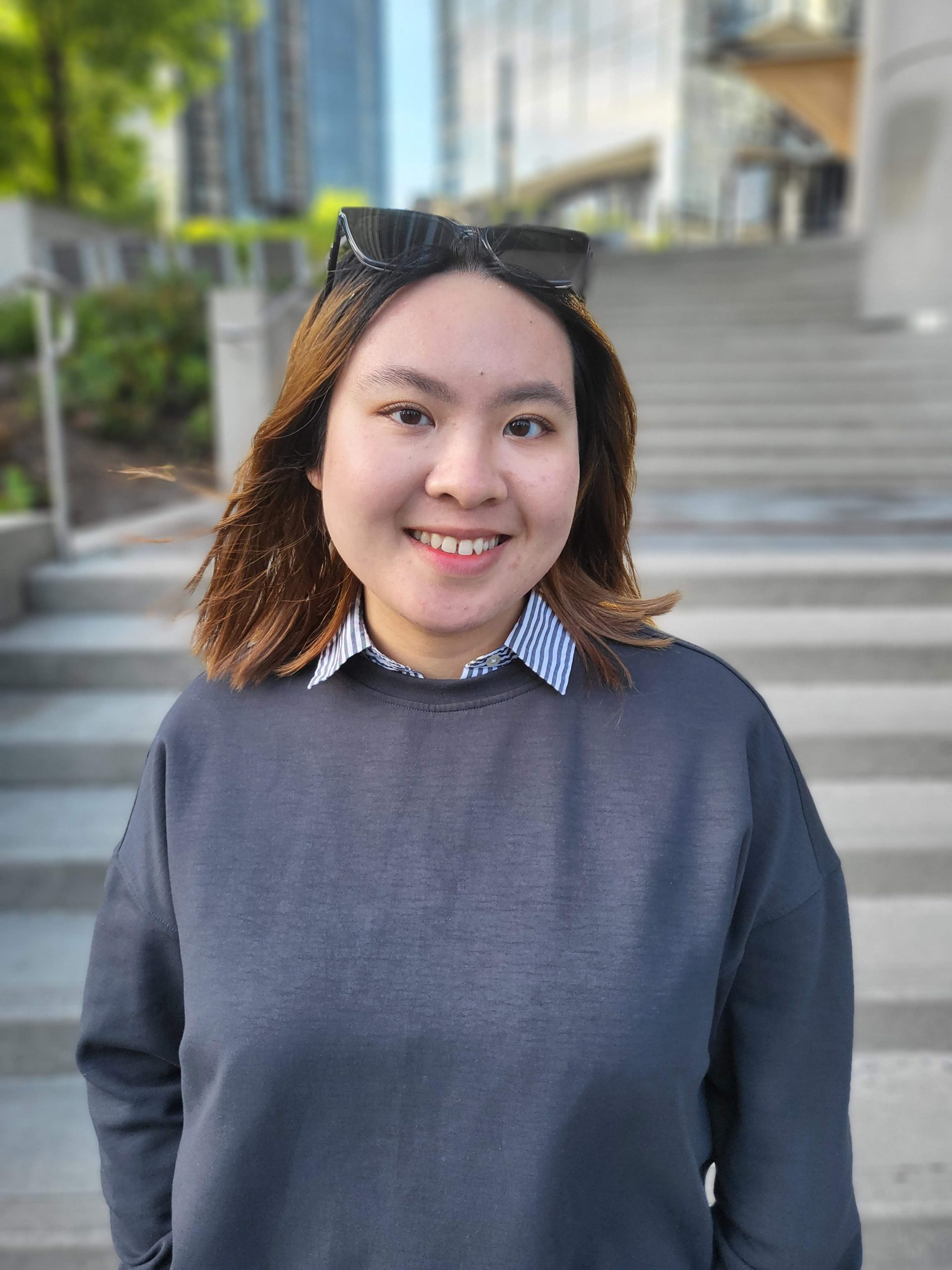
What stood out about LFS to Vivian Li is the Faculty’s commitment to supporting students’ personal and professional development beyond their academics at UBC. The range of co-curricular programming offered and connections she built with the staff gave her the confidence and skills to get involved within the tight-knit community that LFS is known for.
After a peer encouraged Li to pursue her first extracurricular involvement, she realised the difference that having support from just one person could make – and was determined to be that person for someone else. She sought out a multitude of roles within LFS|US, LFS Firsts, and UBC Orientations to directly support incoming and first-year students at UBC, wanting to facilitate connections between students and build spaces of belonging.
Beyond community building, one of Li’s favourite involvements was serving as the LFS Student Senator where she focused on spotlighting the processes behind academic governance at UBC, and strove to engage students with the UBCV Senate. In addition, she enjoyed having the opportunity to support the career development of LFS students while working as the LFS Mentorship Program Assistant within LFS Student Services.
Li is grateful for all the support she has received from LFS staff and faculty throughout her involvements, who have inspired her to pursue a career in student affairs after graduating in May 2023. She is excited to continue building community and supporting students’ personal and professional development in higher education.
Tip for LFS students:
“It’s never too late to get involved! It’s easy to look at someone and only see their success, but we often forget that there is a process, and likely many failures to get to where they are now. Everyone starts somewhere, so don’t let the thought of being a beginner intimidate you before you take your first step.”
We are also excited to highlight our honourable mentions this year: Meghan Lok, Lucy Macdonell, and Torren Kaiser.
Meghan Lok is a part of the LFS class of 2023, graduating with a degree in Applied Animal Biology. Her passion for student leadership, research and animal welfare is highlighted through her extensive extracurricular participation. She has demonstrated student leadership and lasting impact as the first-ever VP Engagement of LFS|US.
Lucy Macdonell is a student in the Applied Animal Biology Program and has made impactful contributions to our community as an active student leader. This past year, she was the team lead of the LFS Academic and Career Engagement (ACE) team, a Senior Orientation Leader during UBC Imagine day, and served as the Applied Biology Program Representative in LFS|US.
Torren Kaiser is a student in the Global Resource Systems Program who has been instrumental to the strong revival of Agora Cafe in the HR MacMillan building. He has contributed extensive time, effort and care to the improvement and operation of this key LFS student resource in addition to being present in the LFS community in other manners.
Congratulations to the winners of the 2023 LFS Undergraduate Student Leadership Award, as well as all of the other students highlighted today.
Tagged with: 2023, Food Nutrition and Health, Undergraduate
Tagged with 2023, Food Nutrition and Health, Undergraduate
Categories: News
June 1, 2023
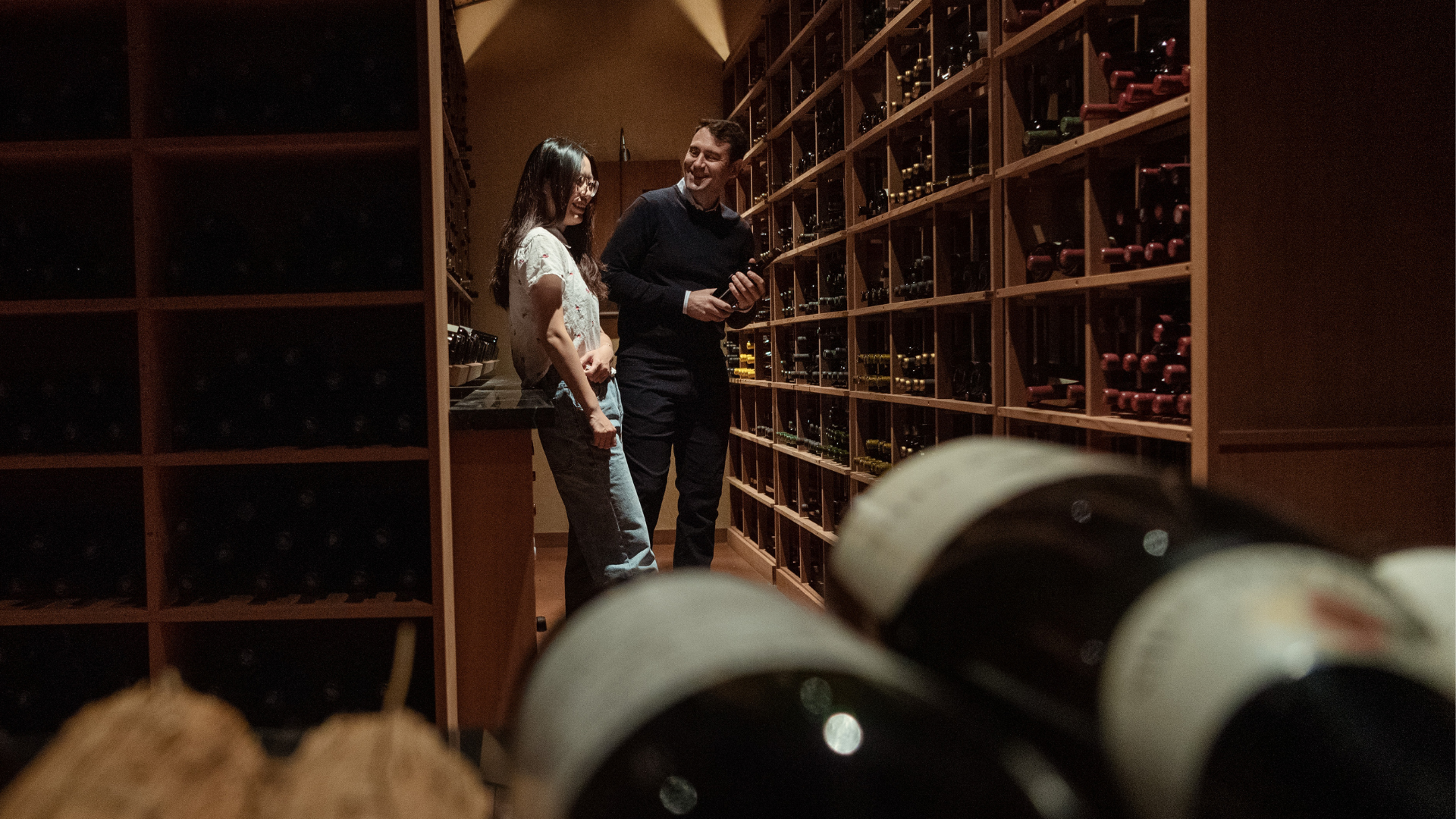
Grapes to Glass is a four-session Wine Education and Tasting Series. You will use your senses as you learn about the important elements of wine production, from grape-growing to enjoying the finished product, with a special focus on B.C. wines. Instructor Jay Martiniuk is a UBC Lecturer in Wine Science and Fermentation, who has worked as a cellar master and winemaker. He earned an MSc in Food Science from UBC, specializing in yeast populations in B.C. vineyards and wineries.
Over the course of these sessions, you will taste over a dozen unique wines and tour the UBC Wine Library – home to more than 4,000 unique bottles of wine.
“Very suitable for every wine lover. It was a chance to get to know wine from A to Z.”
“I look forward to coming to the seminar every month to learn a few more things about wine. And of course, enjoy a few wines with laughter and engaging discussions.”
“My favorite part was getting insight into BC winemaking landscape from someone involved with it.”
2024 Session dates: Four Mondays – January 15, February 12, March 11, and April 8, 2024
Time: 5:30 pm-7:30 pm
Location: UBC Food, Nutrition and Health Building – Theory in Seminar Room (Room 220), Tasting in Wine Library. Address is 2205 East Mall, Vancouver Campus. Parking available in the UBC Health Sciences parkade, 2250 Health Sciences Mall.
Price: $315 (taxes included) for all four sessions
Questions?: Email wine.library@ubc.ca
REGISTER HERE: Click this link
All participants must be aged 19 or older. All UBC events are subjected to campus and venue policies.
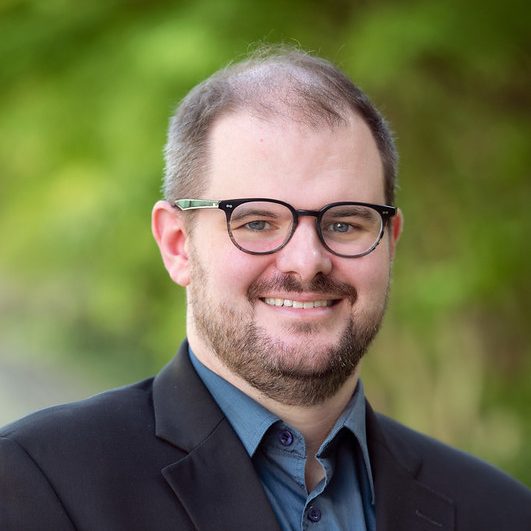
Growing up on his family’s vineyard in the Okanagan, and working as a cellar master and winemaker at B.C. wineries, Jay Martiniuk brings wine-making insights from industry to the classroom. Jay earned his BSc in Food Science in Land and Food Systems. He also completed an MSc in Food Science at the UBC Wine Research Centre in 2021 under the supervision of Associate Professor Vivien Measday, where he looked at yeast populations in the vineyards and wineries of B.C.’s Okanagan Valley.
Read more about Jay here.
An introduction to wine, this course will discuss what to look for in a wine. Learn about the different characteristics of wine: acidity, body, alcohol, and more. You will also tour the UBC Wine Library and experience a "how to taste" demo.
Learn about the types of grapes grown in B.C. and why. Discuss the issues surrounding B.C. grape production and compare and contrast with other wine regions of the world. Tour the sensory lab and taste various B.C. wines that illustrate the unique characteristics of our province's wine.
Explore the winemaking practices in B.C., including an overview of reds, whites, ice wines, and sparkling. Delve deeper into the nuance of wine with secondary and tertiary aromas and flavours, then learn what creates them. This session's wine tasting focuses on how different methods of production affect taste.
Study the bigger picture of the wine industry in the province. Discuss strengths and issues, future directions (climate change), cost/value for money, and what to look for on a label. Learn the principles of food and wine pairing, then apply those skills to a 75 minute pairing exercise.
Tagged with: 2023, Event, Wine Research Centre
Tagged with 2023, Event, Wine Research Centre
Categories: Uncategorized
May 30, 2023
We spoke to a few of our outstanding students from the spring Class of 2023. We look forward to keeping up with these students, post-UBC, as we know they have a bright future ahead!
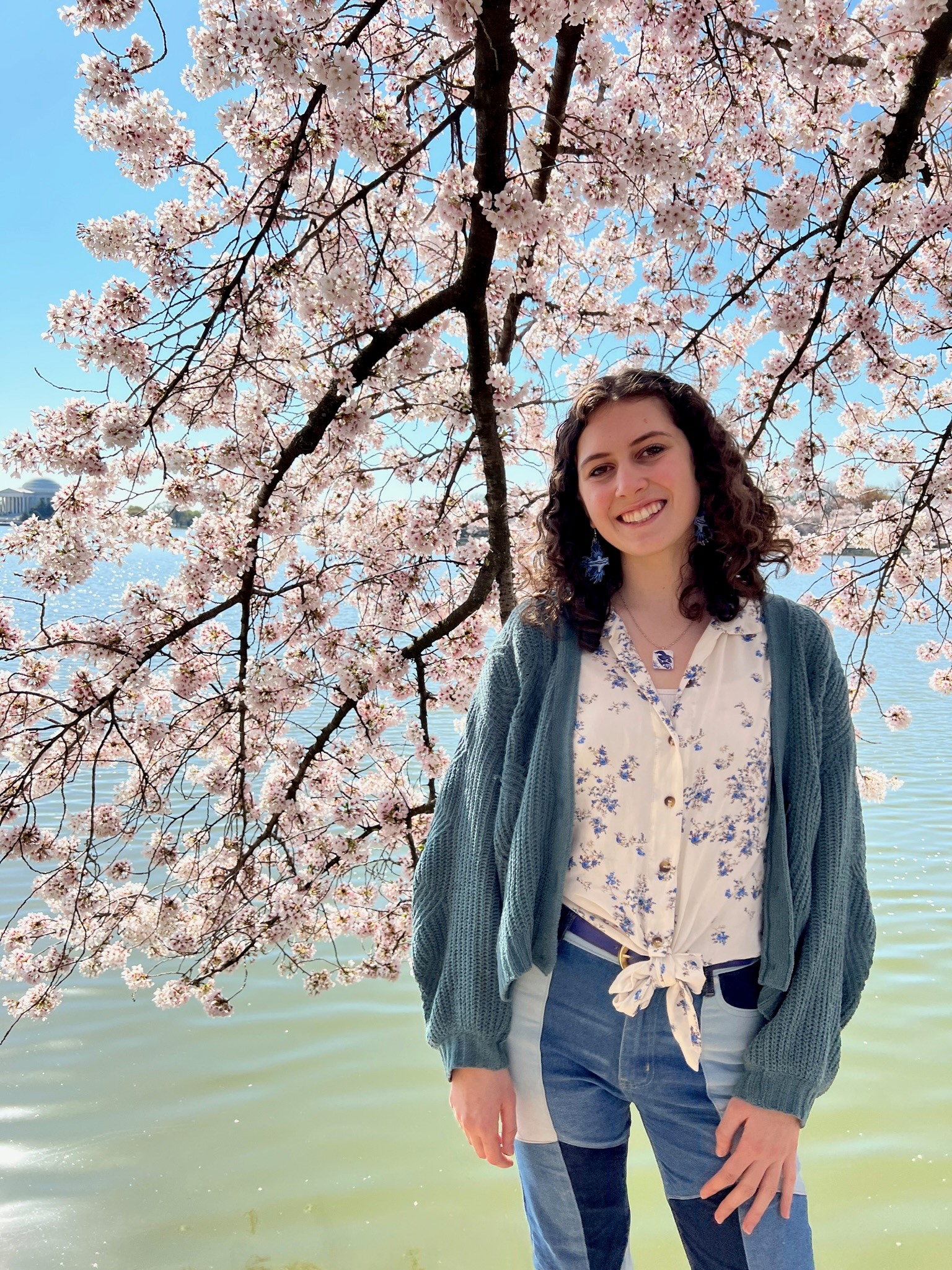
Julia Taylor
How did LFS match your personal and/or professional interests?
This Faculty, and my program especially, gave me the chance to develop existing interests as well as discover new ones through the course of my winding journey of exploring courses and changing my mind a million times during my degree–ultimately landing me in a place where I feel well-rounded and as though I’ve gained a wider and deeper understanding of the world at large. I feel lucky to have found deep passions for real-life issues through my studies in LFS, such as biodiversity conservation, agricultural sustainability, and local food systems, that I am excited to continue to pursue in my career.
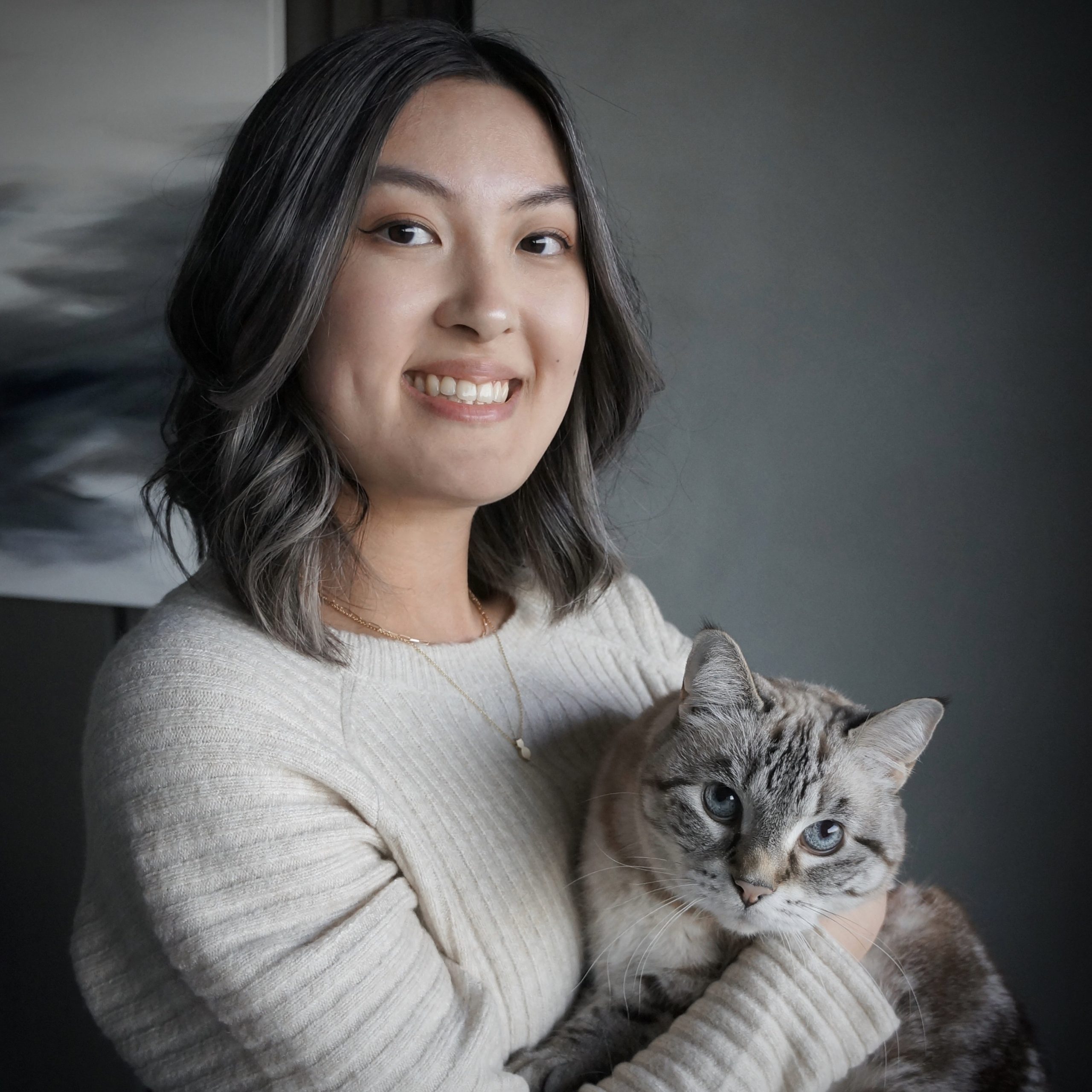
Meghan Lok
Major: Applied Animal Biology
What was your favourite class and why?
There are so many favourite classes to choose from, but APBI 214 and APBI 398 are a close tie! In APBI 214 (Animal Sheltering and Companion Animal Support Services), I had so many lightbulb moments during lectures that made me realize my passion and curiosity for the course material. In APBI 398 (Research Methods in Applied Biology), I could apply my newfound knowledge of animal sheltering and One Welfare in a research assistant role, eventually leading to the opportunity to present at two conferences!
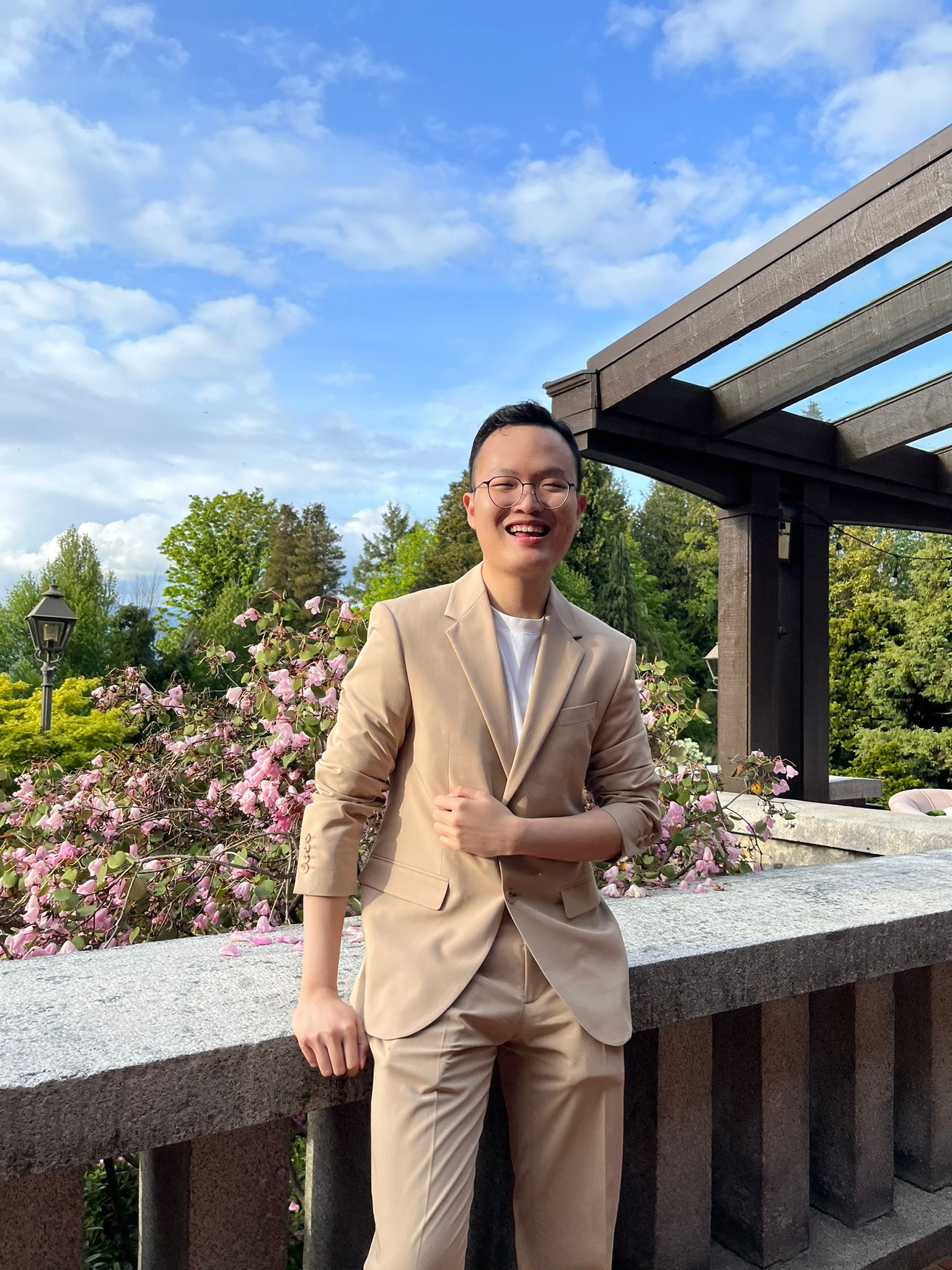
Christopher Mulya
Major: Food Science
What challenges did you encounter while a student and how did you overcome them?
Balancing coursework, lab work, assignments, part-time jobs, and extracurricular activities can be demanding. I managed to overcome this by applying effective time management skills, such as creating a schedule, prioritizing tasks, and avoiding procrastination, which helped me track and reduce stress. I also found it helpful to delegate tasks and seek support from classmates or professors when needed.
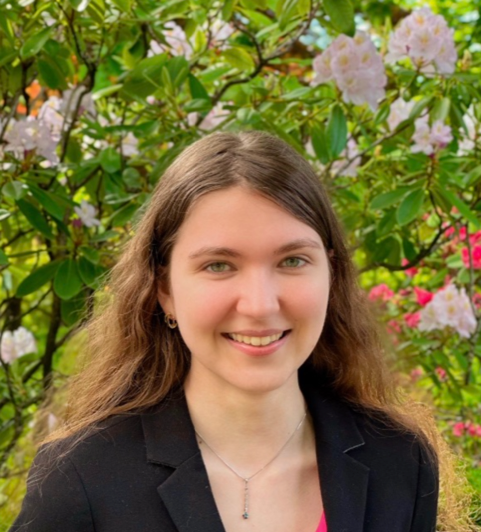
Sasha Dobisz
How did you hear about LFS at UBC?
I heard about LFS from a friend who started at UBC one year before I began applying to universities. I was looking for a program that combined my interests in science with business and economics, and they suggested I look into the Faculty of Land and Food Systems. I found the Food and Resource Economics Program on the LFS website, which fit what I was looking for!
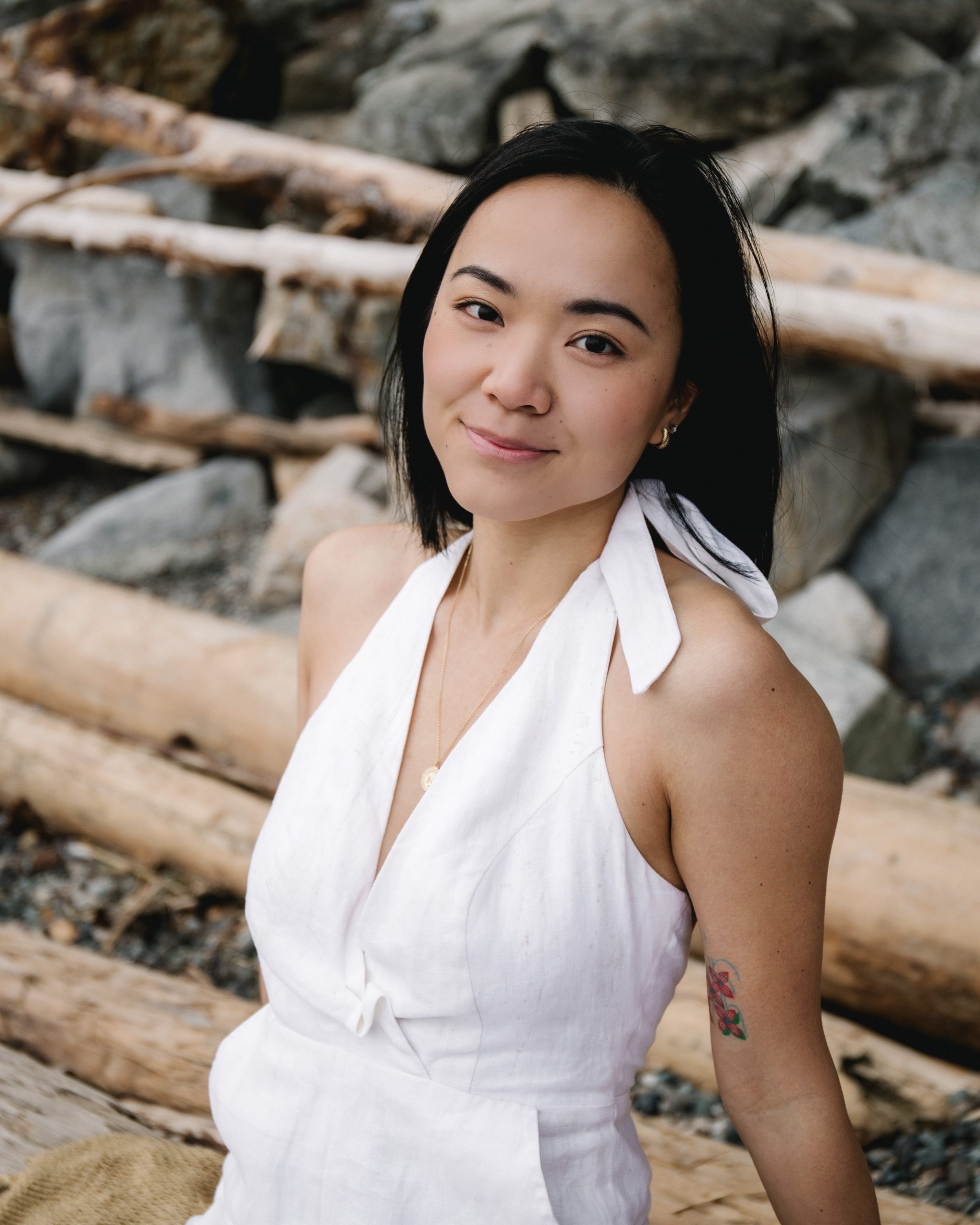
Lian Boltwood
What is the next step for you? Do you have plans post-graduation?
Post-graduation I will be taking a break to travel to Guatemala with some friends. Then I’ll return in June to Vancouver to work as a Food Security Project Assistant with United Way British Columbia, focusing on the programming and implementation of United Way’s Regional Community Food Hubs.
Come September I will hopefully be traveling to the city of Taipei to attend the Mandarin Training Center at National Taiwan Normal University. This would mark the beginning of a 9–12-month journey of language learning and cultural immersion in Taiwan, complementing my minor in Chinese language.
Although I am currently waiting to hear back from my application to the Huayu Enrichment Scholarship, which is a scholarship from the Taiwanese government to foreign students who seek to dedicate themselves to learning Mandarin. I should hear back from them by the end of the month! After that, I remain open minded although a master’s in public health is certainly a strong possibility.
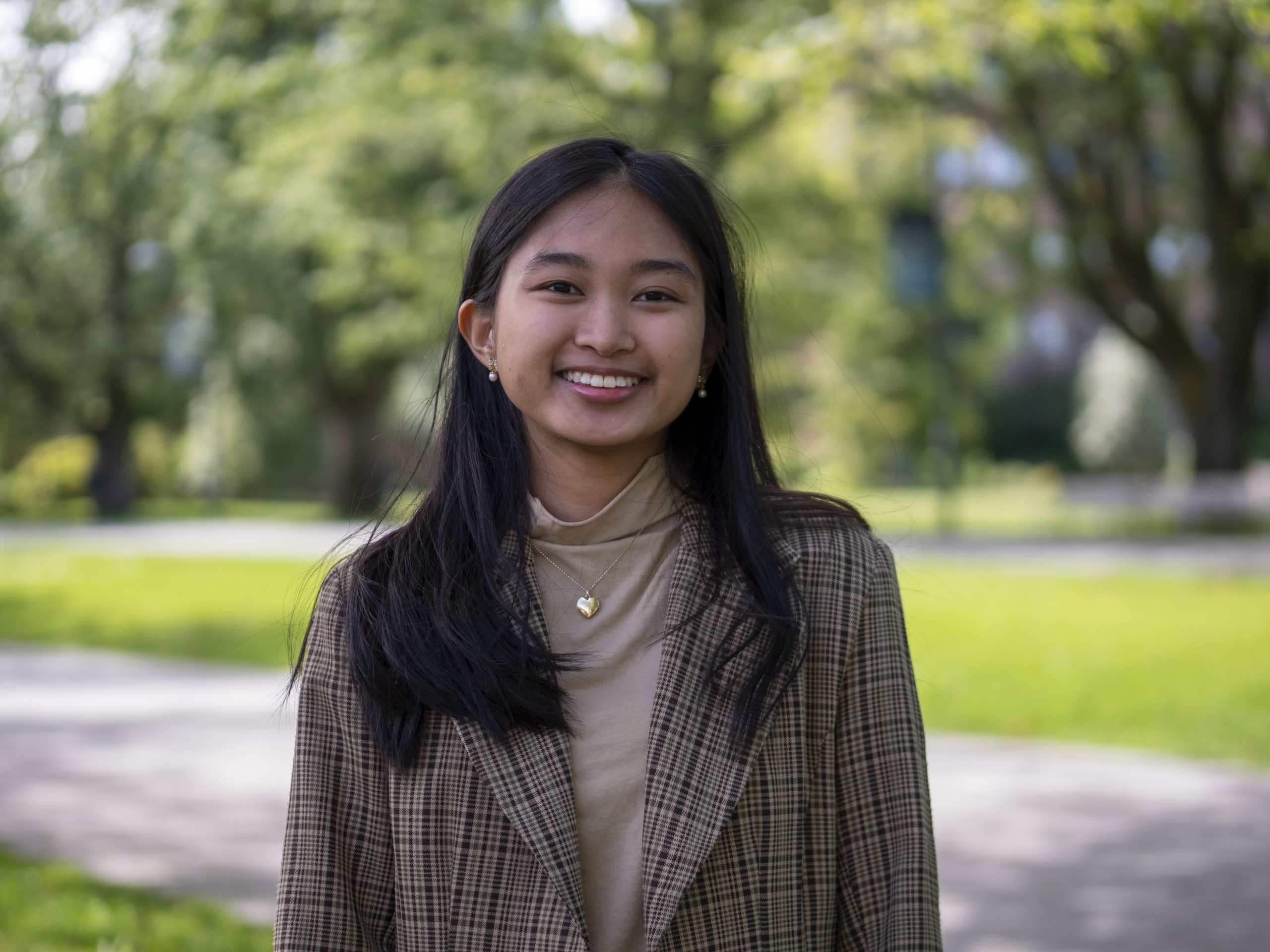
Patricia Angeles
Major: Food, Nutrition and Health
What challenges did you encounter while being a student and how did you overcome them?
One challenge that I encountered as a student was trying to manage my time, especially since I had a long commute to campus from Surrey. I overcame this challenge by testing out different time management strategies. What really helped me was making time blocks in my schedule for specific tasks in my to-do list and prioritizing tasks based on both urgency and importance. I also found that completing most of these tasks on campus allowed me to leave campus at later times of the day and actually made my commute time shorter as I avoided rush hour traffic.
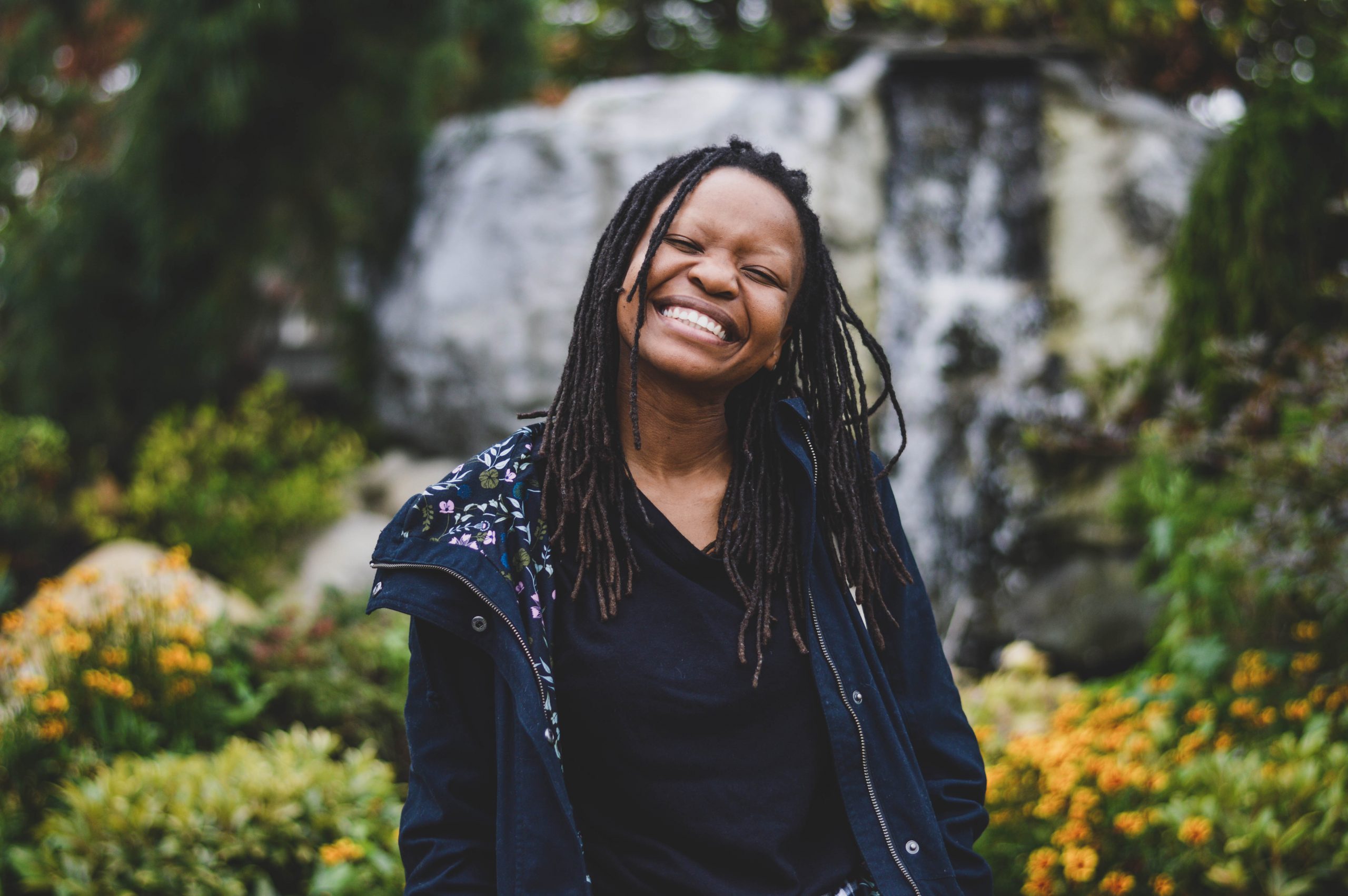
Yolanda Masacha
Major: Applied Animal Biology
Do you recommend students get involved in extra-curriculars? What did you do outside of the classroom?
YES! Getting involved in extracurriculars enriches your university experience, nurtures your interests and challenges you to grow as an individual. In my first year, I volunteered as a gardener with Roots on the Roof which led me to later volunteer as Yard Garden Harvest farmer with the Little Mountain Neighbourhood House.
I was able to enjoy taking a break from classes through getting my hands in soil and growing food! As someone who is interested in social welfare, I have also volunteered with various organizations within Vancouver such as Indian Summer Arts Society, Covenant House Vancouver, Ignite the Warmth Society, BC SPCA to mention but a few. In these various volunteer opportunities, I had the opportunity to build long lasting connections and lifelong skills.
I also worked as a first-year Residence Advisor for two years where I helped multiple students residing on campus in their transition to UBC. In addition, I worked as an LFS Student Ambassador which is a Work-Learn role within LFS Student Services. I was able to leverage my skills in both my volunteer and work position, which would have not been possible if I was not trying new things. I have grown my network through my extracurricular roles and have developed professional skills which I am currently using as a young professional.
Tagged with: 2023, Applied Biology, Food and Resource Economics, Food Nutrition and Health, Global Resource Systems, Undergraduate
Tagged with 2023, Applied Biology, Food and Resource Economics, Food Nutrition and Health, Global Resource Systems, Undergraduate
Categories: News